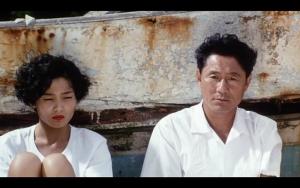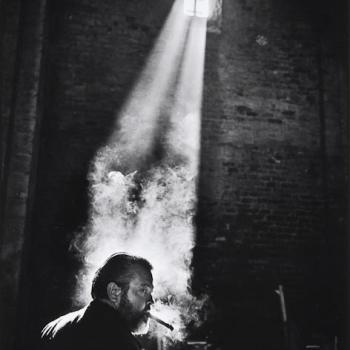
Source: Flickr user Leah
License
Strongmen face a paradox: you need your guys. They must be skilled, capable, and efficient. Otherwise, you won’t be staying strong for long. They can’t, however, be too skilled, too capable. If they make connections too easily or become too independently powerful, they pose a threat. An ally becomes an enemy. And so, you’ve got to get rid of them. But now you’re back at square one. There’s no good help anymore! On account of miserliness, foresight, or both, the strongman—whether a dictator, a mob boss, or a petty industry tyrant—must make the older pass so its essence can persist. But what then? I can almost hear Joe Pesci screaming. La cosa nostra: getting stabbed in the back before you can do the backstabbing.
Sensibly enough, films about this paradox often highlight the paranoia endemic to such organizations. We’ve all seen Henry Hill, coked-up out of his mind, catching glimpses of a helicopter when he really just needs to stir the sauce. And, of course, real life testifies to the same. Or need I mention Yevgeny Prigozhin?
Kitano Takeshi’s Sonatine (1993) takes a different tack: what if intra-Yakuza violence paved the road to freedom for the gangsters themselves? Kitano himself plays Murakawa, a local chief who is asked to clear up a dispute in Okinawa between formerly friendly local affiliates. He knows something is off. It’s clear that Murakawa can barely stand the rigidly ordered hypocrisies of Yakuza life anyway. We see, for example, him light a cigarette in front of his boss before the head honcho has given the “okay.” Still, Murakawa goes. Soon enough, he knows he was right to feel uneasy.
Most of the movie is about Murakawa and his guys hiding, hiding at a beautiful Okinawan beach house. This entire section of the film is filled with play and bonding. The men sumo wrestle in circles drawn in the sand. They shower in rainwater, only to find that the rain stops when they’re half-soaped. One gangster dresses in drag and sings traditional songs; soon enough, he has everyone participating. There’s no violence here. All is simple, all at peace.
Mostly anyway. A couple goons shoot apples off each other’s heads. For his part, Murakawa proves himself to be off his rocker, totally over life as a Yakuza. Tension builds, for example, when we see him play Russian roulette on the beach with some of his underlings. They assume the gun isn’t loaded. He shows them that, unlike what they might expect from a boss, it very much is. Ironically, he can be loyal, be reasonable, precisely because he’s nothing like a regular leader in the gangster world. His insanity, if you can call it that, makes him endearing, trustworthy, not narcissistic and detached.
In typical Kitano fashion, when violence does come, it’s swift, jarring, and (in that sense) realistic. Their dream world will be shattered; the plot requires resolution, not just for the audience’s sake but for Murakawa’s too. His dissatisfaction was already boiling over before he went to Okinawa. Now, in hiding, he has seen freedom, has reveled in otherwise unknowable fun, had a chance to see life as more than turf wars and honorable hypocrisies. After all, this is still a Yakuza movie.
But this resolution is nothing, not even conceivable, without the freedom found in hiding—another paradox for the pile. Sonatine is a quiet film with a calm, piano-driven score and almost no dialogue. Murakawa largely stares forward, exhausted from a lifetime of sucking-up (if he could ever do that successfully) and fighting. His blankness distills what we all feel after a long day or a long week or, hell, a long year. We may not be gangsters, but we do long for freedom. I won’t pretend Sonatine offers a helpful or palatable answer. But I give it credit for tarrying with the question.

















